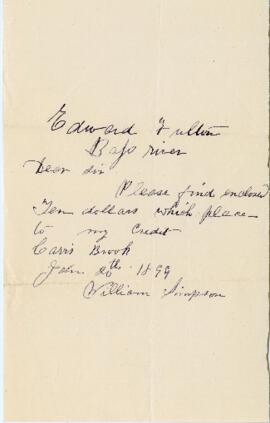Title and statement of responsibility area
Title proper
General material designation
- Architectural drawing
- Graphic material
- Textual record
Parallel title
Other title information
Title statements of responsibility
Title notes
Level of description
Repository
Reference code
Edition area
Edition statement
Edition statement of responsibility
Class of material specific details area
Statement of scale (cartographic)
Statement of projection (cartographic)
Statement of coordinates (cartographic)
Statement of scale (architectural)
Issuing jurisdiction and denomination (philatelic)
Dates of creation area
Date(s)
-
1870-1975 (Creation)
Physical description area
Physical description
Publisher's series area
Title proper of publisher's series
Parallel titles of publisher's series
Other title information of publisher's series
Statement of responsibility relating to publisher's series
Numbering within publisher's series
Note on publisher's series
Archival description area
Name of creator
Administrative history
In 1860 George Fulton and his brother William established small water-powered sawmill at Bass River, Colchester County, N.S. for the manufacture of cheap chairs and other lines of furniture. They were fairly successful, and in 1870 William proposed to move the business to Truro; however, George did not agree and instead bought his brother out and continued managing the factory alone. In 1876 as competition increased and more capital was required to support the business, Fulton turned his business into a joint-stock company and obtained letters patent of Incorporation.
Shortly thereafter George Fulton purchased at auction the Acadia Chair Factory established at Portaupique in Colchester County and owned by William Campbell; this factory was soon transferred to Bass River to become part of the establishment organized in 1876, and Fulton began large scale production of chairs under the name Union Furniture and Merchandise Co. Ltd.
At this time the factory’s market was primarily within the Maritime Provinces, but continued to grow, especially with the addition of cane seat chair manufacture which had originated with the Acadia Chair Factory, as well as the innovative introduction of steam power (added to the existing water power structure) which pushed along the work with new vigour. The factory was innovative in that all raw material (maple and birch lumber) was cut from their own 4,000 acre property or that of nearby individuals; the women of Bass River worked to do the caning for chair seats; and through the steam power plan, which used saw dust and waste material for fuel, the company produced little to no waste throughout the manufacturing process. All in all it was one of the most modern production systems in Nova Scotia.
In 1885 the factory was destroyed by fire, but within a year a new factory was constructed and production resumed. The new factory produced exclusively chairs at the outset, with designs originating from England, France, New England, and in-house designer and crafter Isaac Munroe. Later the company also manufactured school desks and chairs for use in universities and colleges. A second fire on November 3, 1892 heavily damaged the factory, and once again the company rebuilt. During this period George Fulton retired (1888) and passed the business on to his son Suther B. Fulton.
In 1903 the company name was changed to Dominion Chair Company Ltd, and the market expanded beyond the Maritimes to include all of Canada, the West Indies, and many British colonies. The company made 30 different types of tables and chairs, including: chairs for halls and lodge rooms; camps and folding chairs; cane-seated chairs; rocking and commode chairs; rocking chairs; and chairs for children; kitchen, office, and school.
Between 1876 and 1894 the factory produced almost 750,000 chairs, and at peak capacity as many as 125,000 chairs were manufactured annually, a number which dwindled over time to between 30,000 and 40,000 per year in the 1970s. At any given time the factory employed 40 – 70 local workers, often men who worked steadily for 10 or more years; in later years some were third-generation employees.
The factory suffered four more fires, in 1909, 1940, 1948, and 1989, as well as an explosion in 1954, and each time the factory was immediately rebuilt and back in operation, with the exception of the 1989 fire which did irreparable damage. Since Suther B. Fulton, the management of the company has passed through various members of the Fulton family: Sommerville Fulton (1899-1902); Edward Fulton (1902-1912); Reuben Starratt (1912-1924); Scott Fulton (1924-1925); P.D. Hill (1925-1926); James S. Creelman (1926-ca. 1955); John Creelman (ca. 1969 - 1970s). The Dominion Chair Company ceased operations in Bass River in 1989; however, the company continues to operate a general store.
Custodial history
Scope and content
Notes area
Physical condition
Immediate source of acquisition
Arrangement
Language of material
- English
Script of material
Language and script note
Location of originals
Availability of other formats
Restrictions on access
Terms governing use, reproduction, and publication
Finding aids
Finding aid
Associated materials
Accruals
General note
Alternative identifier(s)
Standard number area
Standard number
Access points
Subject access points
Place access points
Name access points
- Acadia University (Subject)


